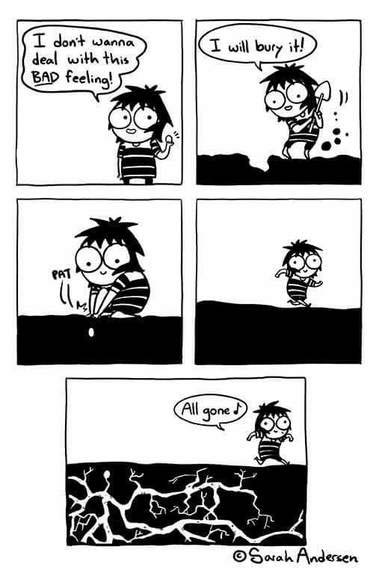This blog post was inspired by one of my favorite cartoons that depicts a person burying a “bad” feeling, walking away feeling like it is gone forever, while the roots are clearly growing under the surface. I think the urge to try and bury our uncomfortable feelings is totally understandable because well, they are uncomfortable! Plus, in our culture, we are not really taught very much about our feelings which leaves many of us at a loss as to what to do with the particularly tough ones… feelings like jealousy, anger, shame, betrayal, anxiety, depression, grief to name a few of the toughies. Not only are we often not taught about how to deal with them, we are often given examples of people coping in unhealthy ways such as through substance use, avoidance, and just plain denial and repression.
Unfortunately, as I explain to my clients at my office, there really is no “easy” way out of tough feelings. We need to wade through them, experience them, and figure out how to let them go in order to learn what we need to from those feelings. For example, if we feel unsettled in a friendship it is worthwhile to sit with that feeling to figure it out a bit… perhaps we are feeling taken advantage of, unappreciated, or perhaps disconnected. If we can take the time to sit with that feeling and learn what it is trying to tell us, we can then use that information to connect with our friend, communicate our feelings, and get some feedback from them too. Ideally, then, some of the challenges in the relationship could be openly talked about and worked on so that things go a bit smoother!
While this example is a bit more innocent, some feelings when left to linger and fester, can be very destructive. These are feelings like anger, shame, depression, and even anxiety. If we are not able to sift through these feelings to figure out what is underneath them and leading to them, they often grow and attach to situations and people that are unrelated to the initial feeling. For example, if someone was verbally abused as a young child and told that they are worthless, terrible, and other kinds of awful things; while they might not continue to have feelings they relate to that situation, they are likely to have other symptoms such as extreme anger, shame and feelings of worthlessness and depression, possibly even suicidal thoughts, or debilitating anxiety around other people. These feelings can play out in so many ways, particularly in our relationships, to where this person might act out in their relationships and treat other people poorly OR they might become the opposite and feel that everything is their fault and tie themselves in knots trying to please their partner or friends. The hardest part about this is that people often have no idea that their behavior or feelings currently could have so much to do with buried emotions related to past experiences in their lives. So the patterns unfortunately continue to be unresolved, their symptoms continue, and it can be very discouraging.
This is often a time when people make their way into therapy looking for solutions and though it is not always the most pleasant of experiences, it is crucial to our growth and ability to move forward to spend some time learning about our emotions, finding ways to cope with them differently, and connecting the dots between our experiences, unresolved emotions, and present life situations. Spending some time unraveling these apparent “bad” feelings is one of my favorite things to do as a therapist, not because it is “fun,” but because it really produces growth and change for my clients.
So, next time you are experiencing an uncomfortable feeling, try to allow yourself to experience it for a moment and invite the feeling into your heart for a bit. If you can imagine the emotion as a wave, let it come and then let it go. Try to find a name for it and try to see what created this riptide in your life. Then you can release it and hopefully find some solutions or lessons from the experience.
If you would like to talk with a Thrive Therapist about yourself, your child, or teen attending therapy, please reach out to us by phone at (858) 342-1304.
As always, thanks for reading and comments are always welcome regarding any issues around child or teen psychotherapy services in San Diego by Thrive Therapy Studio.
To stay in the loop on the services offered and to receive updated information about Thrive, please feel free to sign up for the newsletter through the following link: http://eepurl.com/cvGx5n.
Reach out to start
your healing journey


